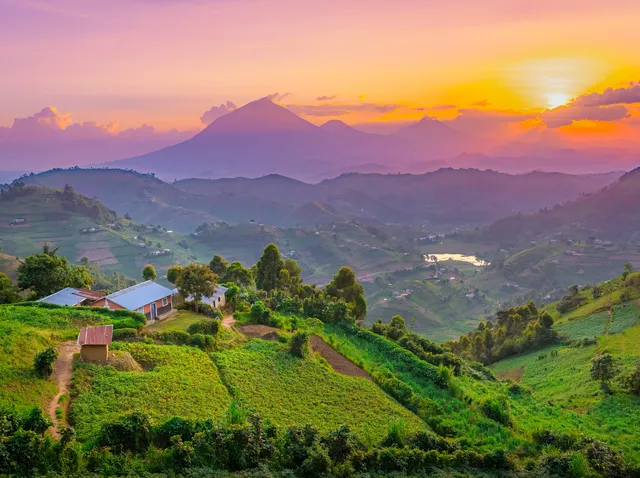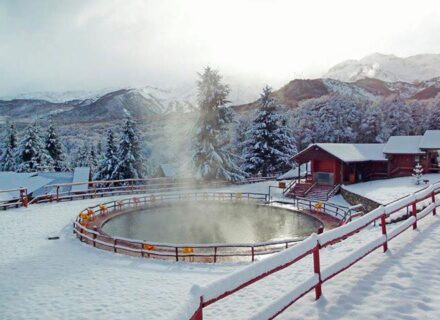Getting to Uganda
Uganda, officially named the Republic of Uganda, can be found in East Africa, lying directly on the equator. Situated in the heart of the Great Lakes Region, Uganda is surrounded by three lakes – Lake Albert, Lake Edward and Lake Victoria. The country shares borders with Kenya, South Sudan, Rwanda, Tanzania and the Democratic Republic of the Congo.
- London to Kampala is about a 10-hour flight
- Los Angeles to Kampala takes around 22.5 hours
- Cape Town to Kampala takes around 5 hours
- Sydney to Kampala is about a 16-hour flight
- New York to Kampala takes approximately 16 hours
Main airport
in Uganda
Uganda has a total of 12 airports. The principal international airport in Uganda is the Entebbe International Airport, located around 40 km from Kampala.
Geography &
landscape of Uganda
Uganda lies in the centre of Africa’s Great Rift Valley. Its landscape consists mainly of flat, high plateaus, surrounded by rolling hills and encroaching low-lying mountains. The central region of Uganda is home to tropical forests and swaying grasslands, while the borders are dominated by mountainous regions such as the Rwenzori Mountains and Mount Elgon. Explore the semi-deserts, the arid plains, the lush tea plantations and rolling savannahs of this unique African country.
Culture, religion
and etiquette
Uganda is predominantly a male-dominated society, with most women becoming housewives while the men work – this is particularly true for the more rural areas. Marriages often happen in their teenage years with polygamy being very common. Men in Uganda quite often have more than one wife.
Ugandans are generally happy, friendly people who love a good joke. Personal space however, is not much of a thing here, and you’ll find that conversations are usually held in very close proximity. Buses and taxis don’t leave until they are filled to the brim, allowing for very minimal personal space while travelling.
In Uganda, it’s common to greet each other with a simple handshake. People of the same gender often hold hands as a symbol of their friendship – this is however no implication of their sexual preferences. Ugandans are fond of small-talk when greeting and tend to communicate indirectly rather than being upfront about issues. As for clothing, it isn’t acceptable in Uganda to wear revealing clothes – that also means that women should steer clear of shorts and short skirts. Ugandan men usually wear shorts as a child and graduate to trousers as an adult.
Uganda is a religiously diverse country with the majority of people following Christianity. 33% of the population in Uganda identify as Roman Catholic, 33% as protestant and 16% as Muslim. The rest of the population believe in various local religions, many of which have a focus on spirits, the deceased and witchcraft.
Top tip!
Keep small change in your purse, so you are ready to provide tips.
Languages spoken in Uganda
Uganda is a multilingual country with over forty native languages in three groups – Bantu, Central Sudanic and Nilotic. The official languages of Uganda are English and Swahili. Most literate people in Uganda speak English, being spoken throughout their school year as well as being widely spoken in politics. Around 4 million people, most of which are in the Buganda region, also speak Luganda. Even though Swahili is the country’s second official language, more people speak Luganda than Swahili.
Capital city of Uganda
Kampala
The capital city of Uganda is Kampala, resting on a set of seven hills on the shores of the largest lake in Africa – Lake Victoria. Standing on the hills provides you with a picture of evergreen countryside interspersed with red-tiled villas with the bustling city down below and the famous Lake Victoria beyond. Kampala is a modern metropolis scattered with pretty gardens and parks on every street – it’s no wonder they call it the greenest city in Africa. Visit the Kasubi Tombs, Kibuli Mosque, the Namugongo Martyrs Shrine Namirembe Anglican Cathedral and St. Peter’s Roman Catholic Cathedral.
Visas for Uganda
To enter Uganda, everyone must have a passport with at least six months remaining from the date of entry. Almost all visitors will require a visa to enter Uganda, which can be processed online, beforehand. A visa can only be obtained on arrival if it has been preapproved. To apply for a visa online, visit www.visas.immigration.go.ug.
The following nationalities do not require a visa to enter Uganda: Cyprus, Malta, Angola, Barbuda, Bahamas, Barbados, Belize, Burundi, Comoros, Eritrea, Fiji, Gambia, Ghana, Grenada, Jamaica, Kenya, Lesotho, Madagascar, Malawi, Mauritius, Rwanda, Seychelles, Sierra Leone, Singapore, Solomon Islands, St Vincent and The Grenadines, Tanzania, Tonga, Swaziland, Vanuatu, Zambia and Zimbabwe.
If you are also visiting other countries in Africa, you can obtain an East African Tourist Visa which allows you multiple entries into Uganda, Kenya and Rwanda – this is a much cheaper and simpler way than buying them separately. A single-entry visa costs $50, and an East African tourist e-visa costs $100.
If you are arriving from an endemic area, you will also need to provide a Yellow Fever vaccination certificate, before being allowed to enter Uganda.
Vaccinations & travel health
The CDC and the WHO advise for the following routine vaccinations to be up to date when visiting Uganda: Measles, Mumps & Rubella (MMR), Tetanus, Diphtheria & Pertussis (TDAP), Chickenpox, Shingles, Pneumonia, Influenza and Polio. They also recommend the following vaccinations for travel to Uganda: Hepatitis A, Hepatitis B, Typhoid, Cholera, Yellow Fever, Rabies and Meningitis.
Malaria is present in Uganda, so we advise travellers to consult their GP for antimalarial medicine for your trip. Dengue and chikungunya are also present in Uganda, so make sure that you are well-stocked with DEET mosquito repellent.
All travellers over the age of nine months will also need to have a yellow fever vaccination – a copy of the certificate will be required for your visa application.
Is it safe to drink tap water in Uganda?
We do not recommend drinking tap water in Uganda – stick to bottled water to be safe. Many villages have water pumps which provide clean water but make sure you check before you use them. There is a risk of cholera in certain parts of the country, so we strongly advise you only to use clean, drinking water and wash your hands often.
Electricity and plugs in Uganda
The plugs and sockets in Uganda are type G, which have three rectangular pins in a triangular shape. The standard voltage in Uganda is 240 V, and the frequency is 50 Hz.
Emergency calls
We strongly advise you to save the relevant emergency telephone numbers in your mobile in case they are needed. The most important ones to note in Uganda are:
999 for the police, fire or ambulance emergency services (if calling from a landline)
112 for the police, fire or ambulance emergency services (if calling from a mobile phone)
Travelling as a single woman in Uganda
Many solo travellers report that on the whole, they felt comfortable and safe while travelling alone in Uganda. Ugandan people are generally very friendly, used to meeting tourists, and usually want to help you by offering advice, directions or simply a pleasant conversation. Uganda is an excellent place for solo female travellers. Most safaris are done on a group basis, as are hikes and other excursions so you shouldn’t be on your own for too long! That said, as with any country, safety levels vary depending on which region you are in. If in doubt ask the staff at your hotel which areas should be avoided.
Here are a few tips for staying safe as a solo female traveller in Uganda:
- Don’t walk alone at night
- Only drink alcohol in moderation
- Don’t flaunt your valuables – better yet, don’t bring any!
- Ugandan women dress conservatively, so do the same if you don’t want to draw attention to yourself.
- Do not hike alone. You may be a competent hiker, but if something goes wrong or you hurt yourself, you do not want to be stuck.
Wifi and internet access in Uganda
Most accommodation (aside from the very basic hotels and guest houses) will offer free wifi, as will some restaurants and cafes. The more rural you travel, the more unreliable the connection will be. Do not count on having an internet connection within the national parks. They may advertise to have wifi, however, the connections don’t tend to be good enough for most online tasks. Internet cafes can also be found in most major cities and large towns.
Time zone in Uganda
Kampala is 3 hours ahead of London (GMT), 11 hours ahead of Los Angeles (PST) and 8 hours ahead of New York (EST). Uganda follows East Africa Time (EAT) and does not switch to Daylight Savings Time. Visit timeanddate.com to calculate the time difference from your current location.
Getting around Uganda
Boda Boda / Motorcycle Taxi
Boda Bodas are a great option if you want to get somewhere quickly as the motorbikes can swiftly manoeuvre through heavy traffic. These do, however, cost more than taking a minibus taxi. Only get on one if they provide helmets.
Taxi
Most taxis in Uganda are minibus taxis which can hold around 14 people. These are a much cheaper option than taking a special hire taxi (see below). They tend to stop at various points along any route so it’s best not to use this option if you’re in a rush.
Special Hire Taxi
Private taxis (the ones which look more like ‘cabs’ in North America) are another popular way to travel. Journeys cost a little more than the shared, minibus taxis but can be a cost-effective way to travel if there are a few of you splitting the bill. Taxis generally don’t use a meter so you can usually negotiate for the cost of your trip.
Car Hire
Hiring a car is one of the most popular modes of transport in Uganda, especially if you like to travel at your own pace. If there are more than two of you, it can also often be one of the cheapest ways to travel. In Uganda, you can either hire a car including a driver, or just hire the car alone.
History of Uganda
Henry Stanley discovered Uganda in 1875 when the country was split into kingdoms. In 1877, Anglican missionaries arrived, followed a few years later by the Roman Catholic and Muslim missionaries. Religions were set on converting Ugandans but were met with much hostility, and in 1886 the first bishop in Uganda was murdered.
In 1888 the European powers divided up Africa and gave the British East Africa Company control of Uganda. In 1904, cotton became one of Uganda’s largest exports, and by 1920 the country was also growing a substantial amount of tea and coffee. Meanwhile, missionaries were building schools allowing the majority of Ugandans to become literate. In 1929, the first railway line was introduced.
Riots broke out in 1945 and 1949, which led to the first Africans being appointed to the legislative council, their members steadily growing over the next few years. During the end of the 19th century, many Asians migrated to Uganda, creating a boom of traders and shopkeepers.
In 1962, Uganda became independent, and Mutesa, King of Buganda was appointed as their first president with Milton Obote running as prime minister. In 1966 Obote staged a coup to take control, Mutesa fled and Obote became dictator. He ruled until 1971 when Idi Amin staged a coup. Amin was responsible for many horrible acts, torturing and murdering over 100,000 people. Amin then decided that he wanted a piece of the Ugandan Asian’s wealth and forced them to sharply leave the country, many of whom left the bulk of their belongings behind. With the shopkeepers and skilled tradesmen being either killed or forced to leave, the economy of Uganda collapsed, and infrastructure deteriorated.
In 1978, Uganda attempted to invade Tanzania but the war quickly turned around and the Tanzanian’s invaded Uganda, forcing Amin and his army to flee. He died abroad in 2003.
Obote became prime minister once again, but his opponents formed a guerilla army called the National Resistance Army which soon controlled a significant part of western Uganda. Obote meanwhile tried to become dictator again, imprisoning anyone who opposed him. During this time the National Resistance was growing, and by 1986, they controlled most parts of Uganda, including the capital city. Obote’s supporters eventually caved in.
Finally, with political stability, Uganda’s economy began to grow, and many of the Asians who were once forced to leave were persuaded to return. Today, Uganda’s economy continues to grow steadily. It is predominantly an agricultural country with its main export being coffee.


